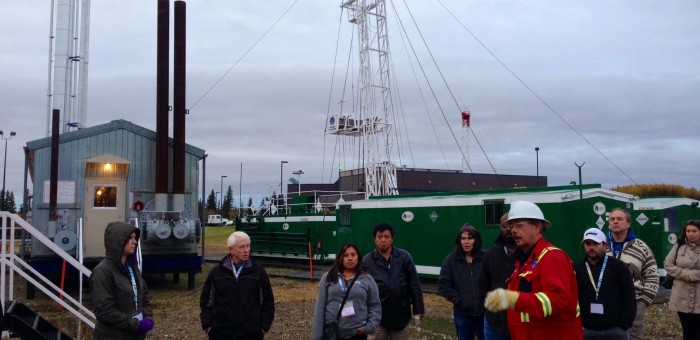Probing the Economics of the BC LNG Hype
Today I was up in Question Period and I took the opportunity to quiz the government about the effects of the recently announced Russia-China natural gas deal on its vision for economic prosperity from a generational LNG opportunity. The government clearly remains confident that their LNG dream will become a reality. It’s evident that there still is no backup plan in case it doesn’t come to fruition.
Below I reproduce the question and answer session from Hansard. Unfortunately, I didn’t get an answer to my supplemental question.
A. Weaver: The government has promised British Columbians a generational opportunity of prosperity through development of an LNG industry.
We’ve been promised a $100 billion prosperity fund, more than 100,000 jobs, a trillion-dollar increase in GDP. We’ve been promised a debt-free B.C., the elimination of the PST, thriving schools and hospitals.
[Applause.]
Hon. Speaker, they should wait for the rest of the question.
Russia, with about 20 times the natural gas reserves as all of Canada combined, just signed a $400 billion 30-year deal with China to provide them with natural gas at a cost of around $10 per million Btu. It’s projected to cost about $6 to $8 per million Btu to get gas to Asia. Natural gas is currently trading at about $4.50 per million Btu in North America. This means that B.C. natural gas is simply not competitive with the new 30-year price target set in Asia.
My question to the Minister of Natural Gas Development is this. What’s the backup plan for economic prosperity in B.C. if its LNG goal is not realized?
Hon. R. Coleman: First of all, I want to thank the member for his question, the first question on LNG in four months in this Legislative Assembly during question period. I want to tell the member this.
Last week British Columbia hosted the most successful government-sponsored conference in the history of the province on liquefied natural gas — or anything, for that matter — in Vancouver. During that conference a tentative agreement between China and Russia was actually announced, which might be able to supply maybe 10 percent of the growth in the Chinese market in natural gas if it actually ever gets built. The distance of the pipeline and the time indicates it will take decades to do.
I sat down with the CEOs and presidents and senior people from all the major companies that are in British Columbia today with regards to liquefied natural gas. Not one of them…. They all told me that this is not a game changer for them. They are still confident in British Columbia. They know we can compete with them globally.
We know the gas will not arrive at the cities, particularly on the coast, in China at the price that was quoted in the press release. It is just not possible. We actually know our prices will be competitive with China, and they tell us they’re still coming and they’re still investing in British Columbia.
Madame Speaker: Oak Bay–Gordon Head on a supplemental.
A. Weaver: Japan is in the process of turning back on its nuclear plants. The Queensland gas fields in Australia are coming on line. Russia is expanding its LNG capacity through Vladivostok. The U.S. is ready to go with LNG exports. Qatar has more than ten times the reserves of Canada. China has more than three times the shale gas reserves of Canada. There is no shortage of natural gas out there to meet world demand.
The reality is that not a single company has made a final investment decision in the British Columbia LNG industry. Yet we have put all our eggs in one basket, and in the words of Preston Manning at the last B.C. Energy Conference in Fort St. John, we’re counting our chickens before the rooster has even entered the hen house.
My question to the Minister of Energy and Mines is this. Will he commit to working towards positioning B.C. as a global leader in the clean tech sector, which will serve as the foundation of tomorrow’s economy, and if so, how?
Hon. R. Coleman: First of all, we do know where the supplies and the reserves are of natural gas in the world. We do know that we can compete on that world market. We have been told that specifically by major companies like Shell and Chevron and Exxon Mobil and BG and Petronas and others. They have actually spent in this province to date well in excess of probably $8 billion or $9 billion in getting towards working on their final investment decision, designing plants and what have you.
Interjections.
Hon. R. Coleman: I know the members opposite want to heckle, because they don’t want to admit that they don’t actually support a vision for the future of British Columbia. They don’t support liquefied natural gas. They don’t support the opportunity. But the reality is this.
Interjections.
Madame Speaker: Members.
Hon. R. Coleman: These people have sat down with us. We’ve worked out the financial parameters. We know that we’re competitive globally. We know we’re going to get a final investment decision, and we know we will be successful on this file.
Interjections.
Hon. R. Coleman: I know the members opposite are heckling because they are so nervous about the fact that they are opposed to liquefied natural gas in B.C. But I can tell you this, Member opposite. I’ll tell you this very simply. You doubted my optimism going into the election last year; don’t doubt my optimism in going onto this file.





One Comment
Thank you Andrew Weaver! I find it difficult to fathom where their heads are at. It is just not logical that a fossil fuel based economy will pull the world out of the Greenhouse gas conundrum. This is especially true when there will not even be a carbon tax which would be used for research and development for clean technologies.